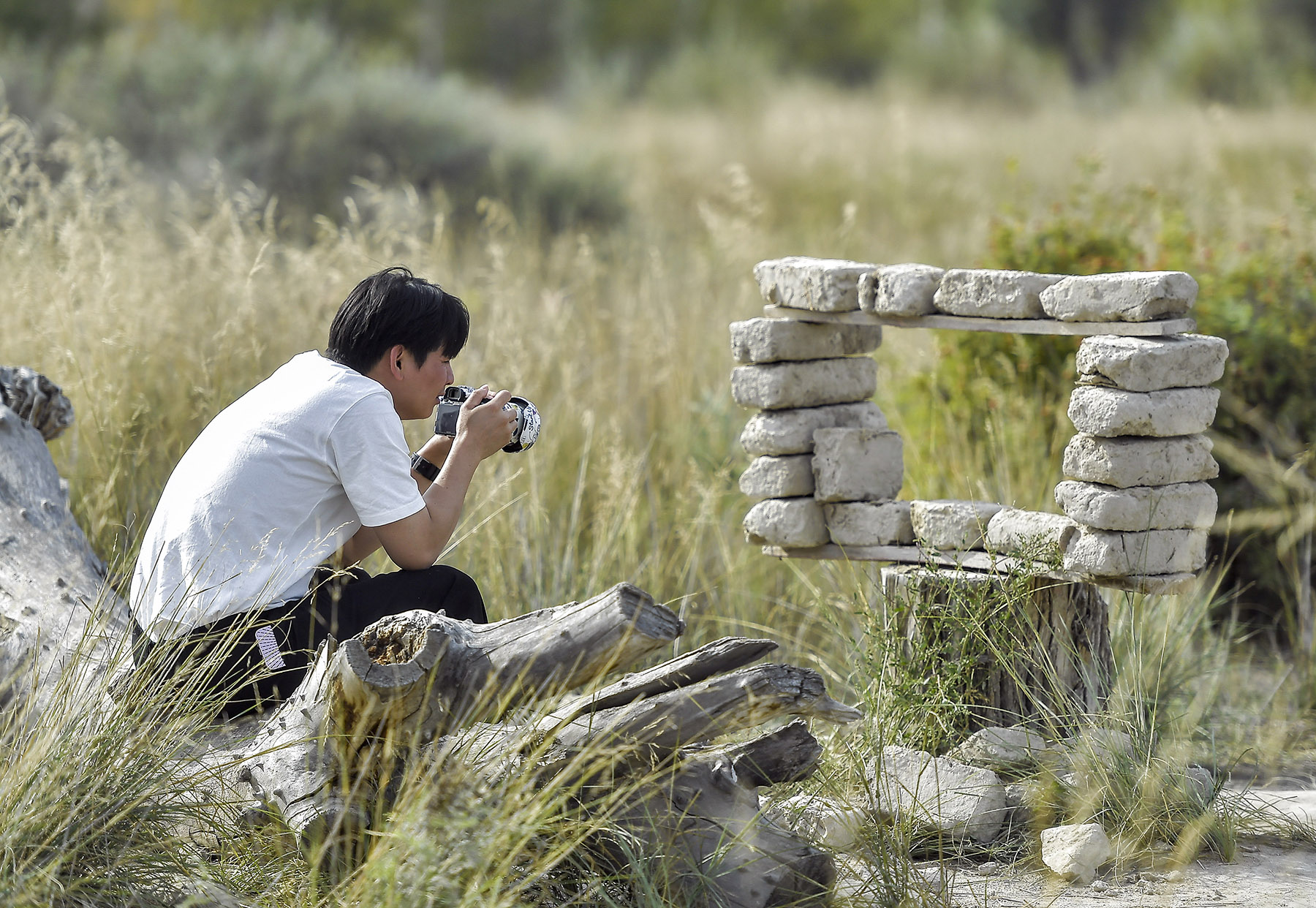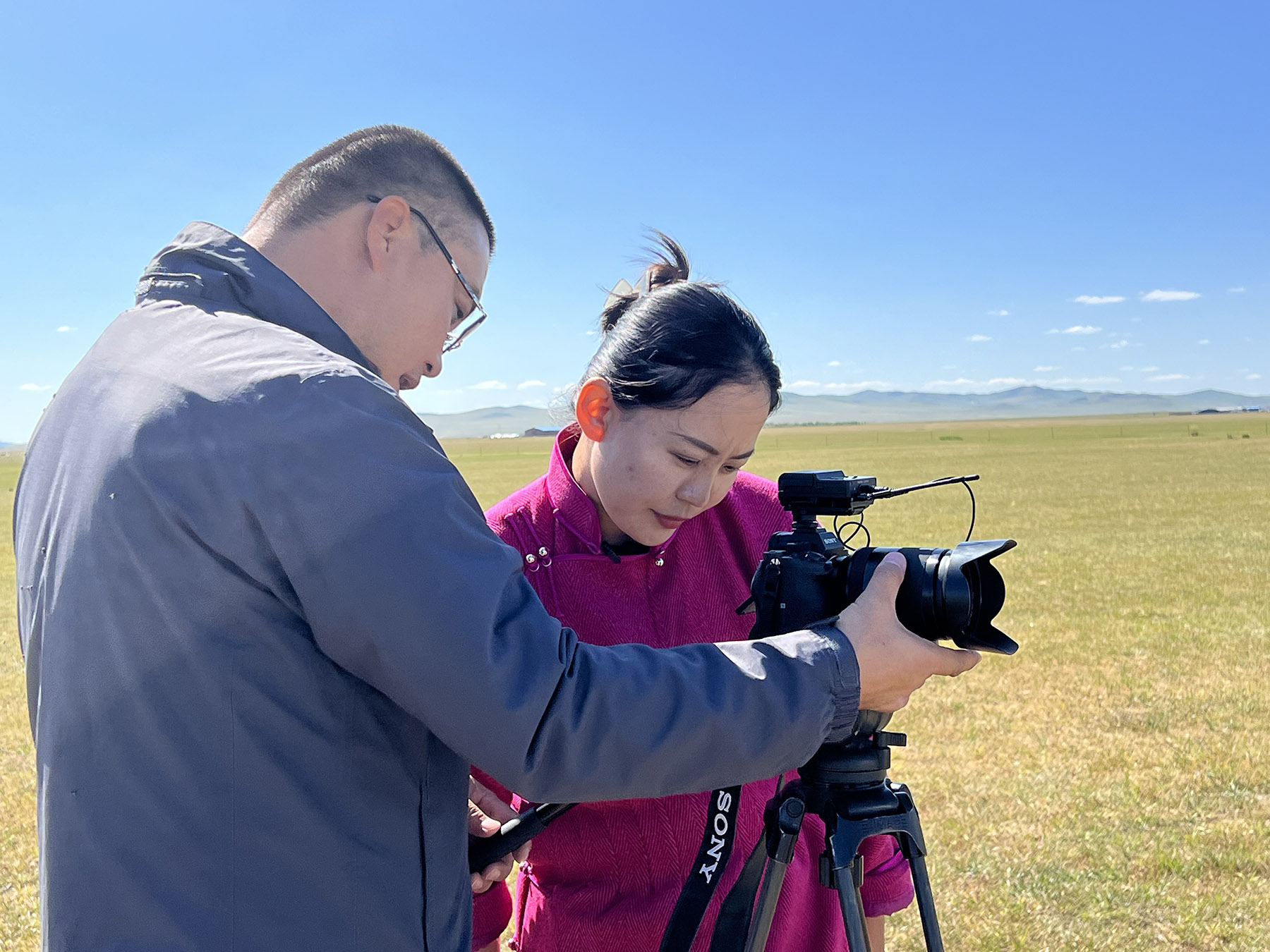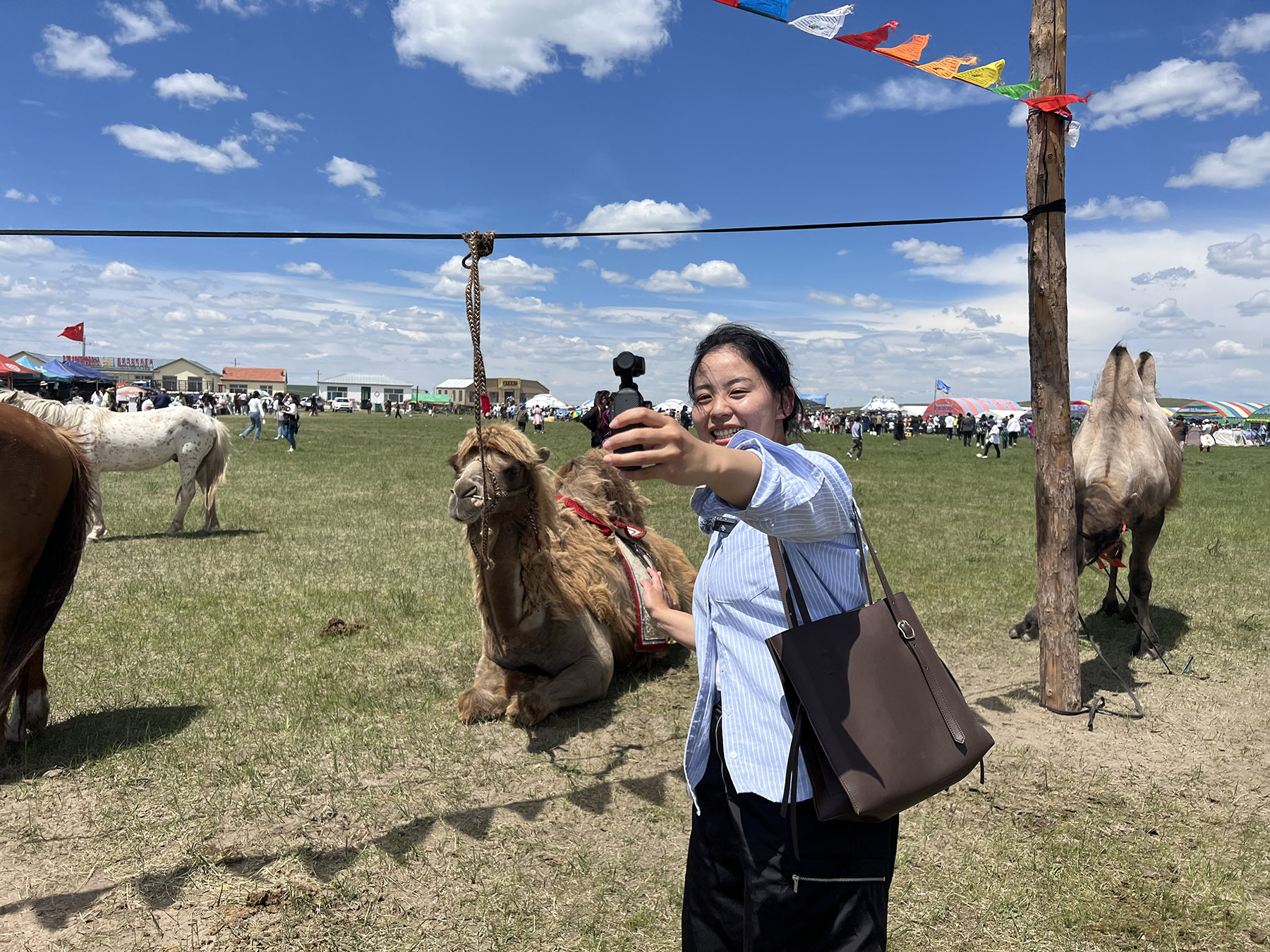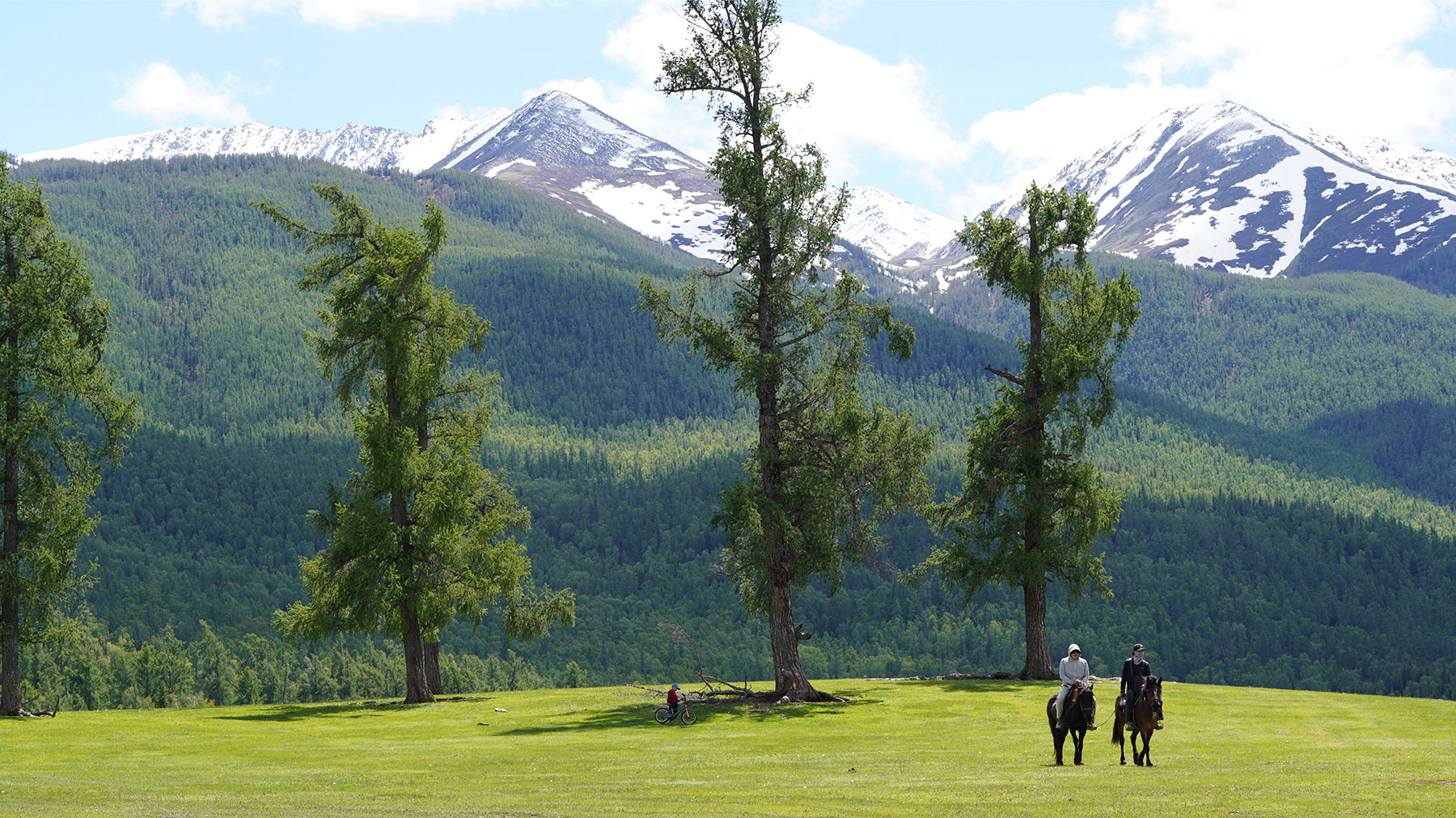Videos about herdsmen, nomads attract growing number of city followers

Uyinga has been sharing videos about the daily life of her family living on grassland in the Inner Mongolia autonomous region on social media for the past six years. Besides learning about herdsmen's daily routines such as grazing livestock and cooking traditional Mongolian food through the videos, viewers can observe the stunning scenery of the grassland while listening to the sound of the wind blowing.
"I don't have any scripts. I just record the herdsmen's normal life on the grassland in Xi Ujimchin Banner. And I think that's the reason why people like them," Uyinga, from the Mongolian ethnic group, said.
In her latest videos, her family is seen busily cutting grass in September that had started to turn yellow, and then storing it to feed livestock in the winter.
READ MORE: Rural areas taste commercial success
"As you can see, the grassland isn't always green. Its beauty varies in different seasons," the 29-year-old says in the video. "And we must get certain things done before winter comes, such as cutting the grass. As herdsmen, we have learned to respect nature and follow the rules of the grassland."
Uyinga said she hopes the videos she has posted on social media can help more people gain insights into the life of herdsmen and bring members of different ethnic groups closer. She's also glad to see that more young women from the Inner Mongolia, Xizang and Xinjiang Uygur autonomous regions have started to share their stories about the beautiful pastures on social media. Their simple but colorful lifestyles have become increasingly popular in recent years with many people yearning to escape the grind of life in the country's major cities, she said.

Home on the range
In 1995, Uyinga left her home on the grassland to study at the Inner Mongolia University of Finance and Economics in the regional capital, Hohhot. After graduating with a bachelor's degree in land resource management, she immediately decided to return home as she believed the vast grassland has more opportunities to offer than big cities.
"I was born on the grassland, and I have a free spirit. And the infrastructure such as roads and telecommunication on the grassland has been significantly improved, so it can be just as convenient to start businesses at my home," Uyinga said.
Following the recommendation of a career adviser on e-commerce, she started to post videos about the life of herdsmen on social media in January 2018.
"There wasn't any influencer posting about the life of herdsmen in Inner Mongolia back then. And my first goal was to clear up people's misunderstandings about herdsmen," she said.
Like many people from the region, Uyinga is often asked if locals ride horses to school and work.
"Many people aren't familiar with life and culture on the grassland. In fact, the herdsmen's life on the grassland has also been improved and modernized. At the same time, we have kept our traditions alive," she said.
Besides enjoying the stunning sunrises and sunsets in the short videos posted by Uyinga, people are particularly interested in how her family prepares traditional Mongolian food, such as dairy products, milk tea and boiled meat.
One of Uyinga's videos that went viral features her family storing meat for a harsh winter ahead. It has received more than 9 million views on social media platforms.
"I've never imagined people can be so interested in our normal routines. It has made me more determined to promote our rich culture and heritage," Uyinga said.
She now has more than 1.18 million followers on the short video platform Douyin, but she said she doesn't like to be called an influencer. "I am simply a recorder of the grassland and the lifestyle of the herdsmen," she said.

Nomadic lifestyle
Many people heard about Xi Ujimchin Banner for the first time because of Uyinga's videos. And many of her followers have come to visit the banner, which is famous for breeding white horses.
"A longtime follower of mine from Guangzhou city (Guangdong province) said everything seemed so familiar when she arrived in the banner because she has seen it all before in my videos," Uyinga said, adding her videos have boosted understanding among people from different places and ethnic groups.
In the future, she plans to include more content about the cultural heritage of the Mongolian ethnic group in her videos as well as local people's stories, she said.
Unlike Uyinga who has already mastered making and posting short videos, Gausar Kinnes from the Kazak ethnic group is a novice when it comes to using social media platforms to let more people know about the lifestyle of Kazak herdsmen in Xinjiang.
Earlier this year, the popular TV series To the Wonder, based on the novel My Altay by author Li Juan, turned the spotlight on the nomadic life of the Kazaks in Altay prefecture in Xinjiang.
Some of the scenes in the TV series were shot in Naren summer pasture where Gausar was raised.
Since May, the young university graduate has been recording her family's routines on the pastures and sharing them on social media, after many people showed great interest in the life of Kazak herdsmen.
"I've been moving with my parents and the livestock to different pastures as the seasons change since I could walk. But I still see myself as a trainee herder," Gausar said. Kazak herders move between the winter pastures, spring-autumn pastures and summer pastures throughout the year, she said.
Gausar said she decided to leave the city and return to the grassland because she wanted to be with her family.
"Also, I want people to know that we have still kept our nomadic life by sharing our life on social media," she said.
Besides sharing how her family grazes sheep and cattle as well as the tough trips moving livestock to different pastures, in her videos she also teaches people how to make traditional Kazak food and drink, such as milk tea. What's more, she also often teaches people how to speak basic Kazak phrases.
"Many people comment that they envy that we can live in such beautiful places. In fact, as herdsmen, we have a lot of work to do and go through many hardships. There is no easy life," Gausar said.

Rustling up views
Tashi Chodron from Zari township in Xizang's Lhunze county quit her job in Lhokha city and returned to her home at the southern end of the Himalayas in 2023.
The 26-year-old said she saw the opportunities to develop tourism in Zari when more tourists started visiting the township after road conditions were significantly improved. Zari is perched on a high plateau and offers unique natural scenery.
"Many people in Zari have opened homestays and received more income, so I believe I can also start my own business," said Tashi Chodron, who is from the Tibetan ethnic group.
Her family owns a pasture and a hut that they stay in when grazing yaks near the Coga Lake with the backdrop of the glaciers, waterfalls and forests. Tashi Chodron said she is very familiar with the way to the lake, which has become a popular destination among hikers.
In August 2023, a social media influencer came to Zari and she served as his guide. Inspired by the influencer, on Oct 16 last year she started to regularly post videos on Douyin about her daily life on the pasture.
ALSO READ: Beating back the desert
A video she posted in July featuring the scenery of the Coga Lake and the family pasture received a multitude of comments on the "stunning "views, which also said they were looking forward to seeing more videos about Zari.
"People's positive comments have made me more determined to make more videos and introduce my home via social media, which has made Zari no longer remote," she said. "Making videos while hiking to the Coga Lake is so much more difficult than grazing livestock."
Besides natural scenery, Tashi Chodron has also been posting videos on how local people celebrate different festivals and introducing different aspects of Tibetan culture. "I am still new when it comes to becoming an influencer, but I want to try my best to let more people learn more about Zari and our life," she said.
Tashi Chodron is currently building an eight-room homestay in the township to meet the increasing demand for accommodation from visitors.
"I hope my career can take off both online and offline thanks to the development in border areas of Xizang," she said.


